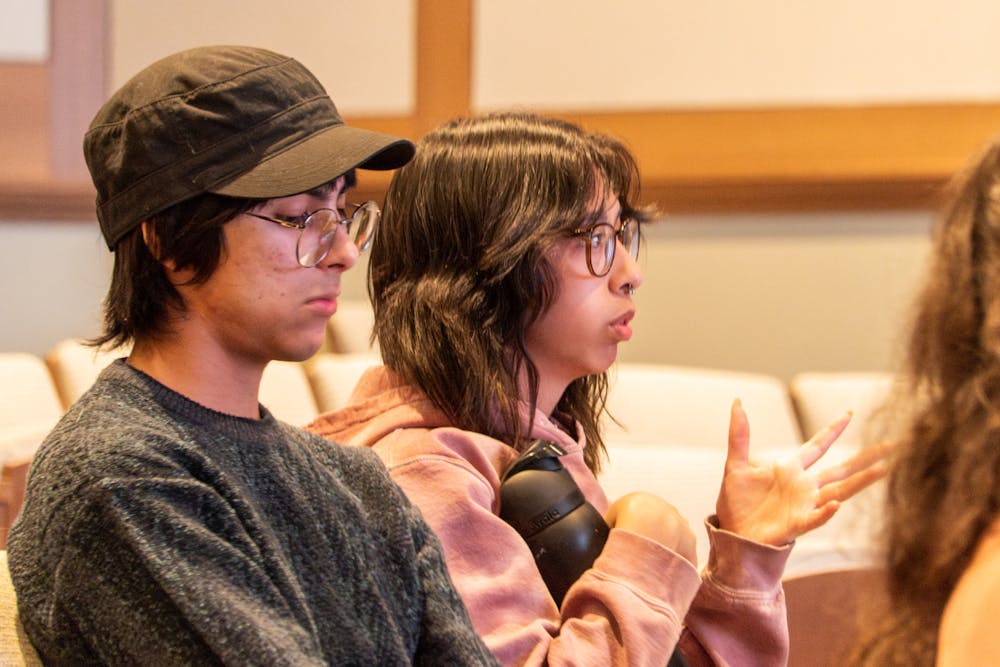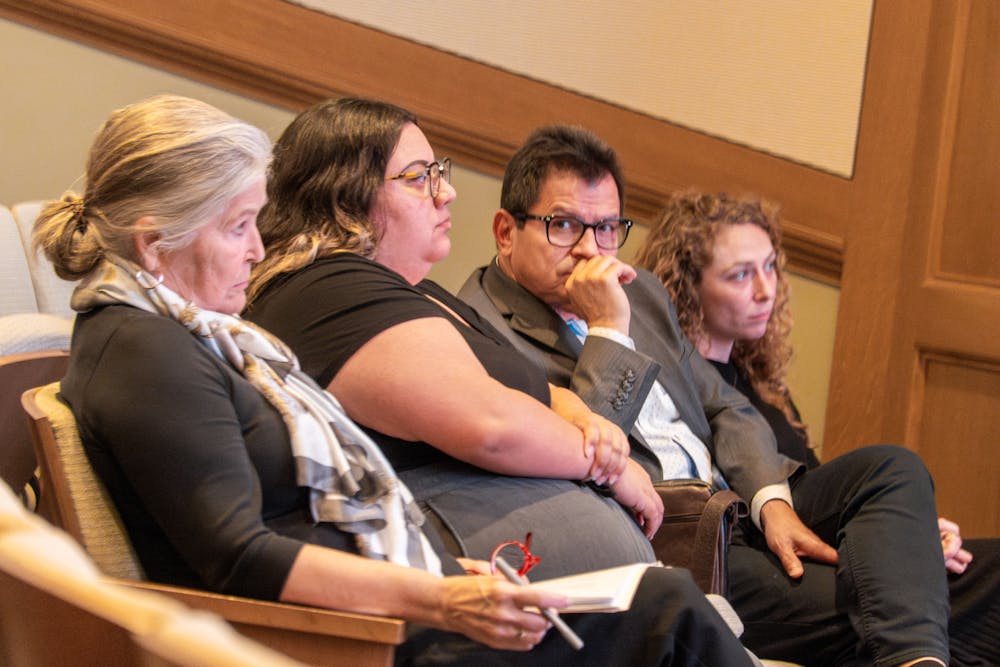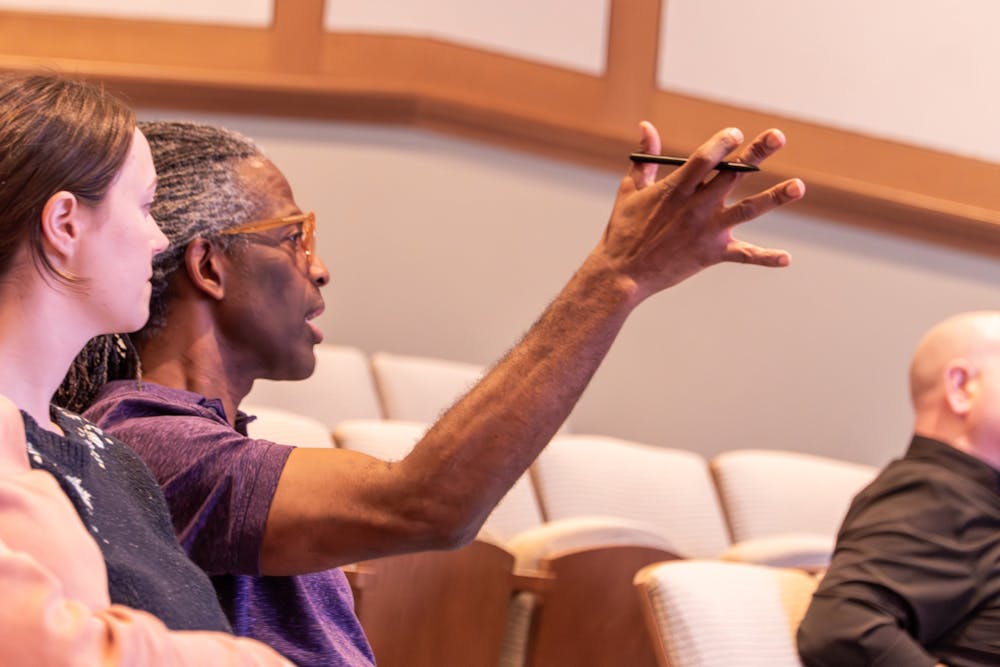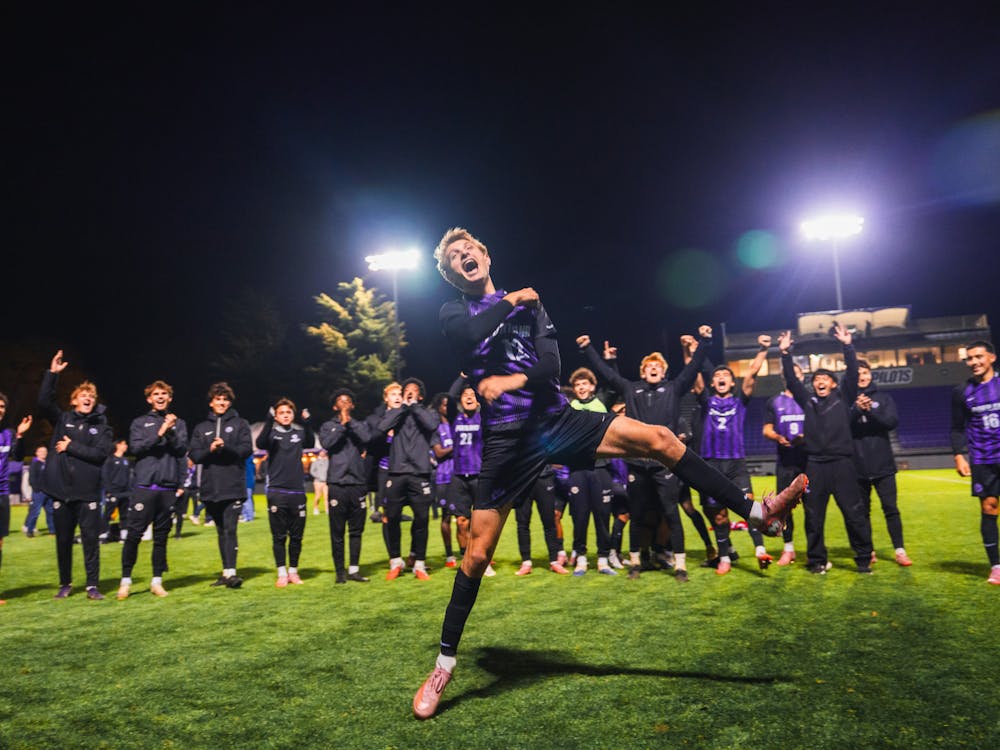With recent U.S. Immigration and Customs Enforcement (ICE) actions affecting two UP families, the Moreau Center for Service and Justice is looking to fight fear with preparation.
The center hosted a “Know Your Rights” event for community members on Oct. 6, that featured advice on the best actions to take when approached by ICE.
Catholic Charities of Oregon Immigration Legal Services (ILS) attorneys and Department of Justice (DOJ)-accredited representatives spoke, as well as Director of Campus Safety and Emergency Management Michael McNerney.
Organizers Tshombé Brown, director of diversity, equity & inclusion and Claire Mcllwain, director of the Moreau Center, cite in part faculty and student concern as the event’s catalyst. ICE activity in North Portland also increased their urgency to host the event.
“This became more urgent when two fathers of our students were detained, and so our community needs us to be behind them and provide resources like this,” Brown said.
The event was scantly attended with an audience of 12. Brown floated the possibility of a Zoom option for future events so more people can attend.
Interacting with ICE
McNerney opened the event by presenting the university’s plan for ICE activity on campus.
Recommended actions haven’t changed since President Kelly’s latest message of guidance — community members are encouraged to direct anyone who claims to be law enforcement to the Campus Safety office, according to McNerney.
For off-campus ICE interactions, advice from the lawyers weren’t as straightforward as the on-campus guidance, and differed depending on the location of the interaction.
Some recommendations, however, remained consistent.
Melissa Rodney, the DOJ-accredeted representative who led the presentation, strongly advises that all interactions with law enforcement be recorded from a safe distance — 6 to 8 feet away — in order to protect oneself from civil rights violations.
“The main purpose of recording is that it's your word against the ICE officer if you're not able to prove the civil rights violation that happened to you,” Rodney said.

Audience members ask questions at the 'Know Your Rights' event on Oct. 6.
Rodney also says that in all situations, individuals have the right to remain silent and are allowed to request an officer’s badge number, reason for the interaction and warrant.
It’s also important to pay close attention to the warrants law enforcement might produce, according to Rodney.
A judicial warrant might give law enforcement the right to search and seize private property or make an arrest, whereas an administrative or immigration warrant only gives officers the right to arrest a person suspected of violating immigration laws.
Individuals should watch out for any mistakes present on the paperwork that would invalidate it, including errors in name, address and Alien Registration Number, according to Rodney.
“Nine times out of 10 these warrants don't have the proper identification of the people that they're looking for,” Rodney said.
Rodney and ILS Director John Herrera also say it's essential not to be combative with officers during these interactions, as running from or fighting with law enforcement will give them probable cause to detain, as well as impact an individual’s ability to receive bond.
ICE at the home
“Pop quiz,” Rodney said. “If ICE is at your door, do you open the door?”
The audience gave a resounding “No.”
That’s the golden rule of ICE interactions at home. All of ILS’ general interaction advice still applies, and it's important for the individual to state while recording that they don’t consent to law enforcement entering the home, according to Rodney.
ICE at the workplace
Rodney encourages individuals to prepare for ICE interaction at their workplaces by asking employers for the plan in place for such incidences.
When law enforcement arrives at the workplace, it’s necessary to ascertain whether the officer has a warrant that allows them to be in private spaces, or just public ones, as many workplaces have a mix of both spaces, according to Rodney.
ICE at your car
While in your car, law enforcement will likely ask for identification. Individuals, drivers and passengers can show any form of ID, as long as it does not specify place of birth or country of origin, according to Rodney.
Oregon driver’s licenses do not specify country of origin, while Permanent Resident Cards or green cards do.
Individuals should clearly state while recording that they don’t consent to their car being searched and again ask for badge numbers and warrants, according to Rodney.

Three Catholic Charities of Oregon Immigration Legal Services (ILS) lawyers and Claire Mcllwain, director of the Moreau Center, sit in DB Auditorium. The lawyers helped to answer audience member questions.
Detainment
If an individual is arrested and detained in the Portland area, they will be taken to the Portland ICE facility, according to Rodney.
From there, the clock starts down for 12 crucial hours.
The facility’s city land-use permit only allows detainees to be held for 12 hours. Though the building's compliance with that rule has come into question, individuals are still likely to be transferred after that period to the Northwest ICE Processing Center (NWICP) in Tacoma, Washington, according to Rodney.
In that 12 hour zone, families can contact attorneys to fight unlawful detainment, and if the detainee is an Oregon resident, their attorney can file a habeas corpus petition in the U.S. District Court and a temporary restraining order to keep them in the state, according to Rodney.
Rodney says once transferred to NWICP, visitation becomes more difficult, and detainees are not released without a bond hearing.
If a detainee’s family can’t afford an attorney, the ILS lawyers suggest community members contact the Equity Corps of Oregon, which provides rapid-response counsel at no charge, though Herrera encourages families to seek legal help prior to any ICE interaction.
“I would highly recommend parents and community members and people to talk to attorneys ahead of time, not at the time of the arrest, at least to know, ‘Do you have an opportunity? Do you have a case? Do you have an option because you were a victim of a crime? Do you have something in the records that might help you?’” Herrera said.
ILS and similar organizations also provide low-cost legal consultations to answer those questions.

Tshombé Brown, director of diversity, equity & inclusion, asks a question during the 'Know Your Rights' event on Oct. 6.
Takeaways
Though few attended the presentation, the small audience was engaged and asked several questions throughout. After the hour-and-a-half event, Brown’s biggest takeaway was a sense of the information’s urgency and a feeling of fear for community members.
“My biggest thing at the end was the sensation of just reinforcing how urgent things like this are and that we're in unprecedented times in my lifetime,” Brown said. “I was just commenting that it's scary for me, and I'm not the one being targeted. What about our community members whose family members are?”
Herrera ended the session with a call to action, encouraging attendees to share what they learned with the wider community.
“[What’s most] important is that you can, without advising anyone, just be a light,” Herrera said. “Students that come into study shouldn't worry about their parents being detained. It's important for college students to be aware that there are many resources.”
Maggie Dapp is the News and Managing Editor at The Beacon. She can be reached at dapp26@up.edu.








